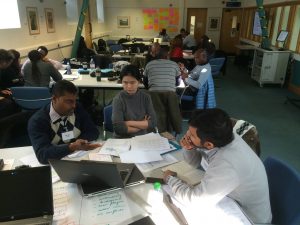A dissertation is a critical part of the masters programme, required for you to graduate. By definition dissertation means: “a substantial paper that is typically based on original research and that gives evidence of the candidate’s mastery both of their own subject and of scholarly method.”
There is a wealth of material on aspects of doing dissertation research, from working in a conducive physical environment, through planning and time management, to academic writing style. You may be well adept with researching and have a flair for writing; or could be like many other students, especially those who have little or no experience of producing an academic dissertation.
Outlined here are some of the key points that would help you write a dissertation worthy of ‘full marks’ leading you to your prized Master’s degree.
- Choosing a topic
A good start can give you a good finish. This is perhaps the first and most crucial step that you would be taking in the process of producing a good dissertation. There is a considerable literature on ways to decide on a topic, plan and write up a dissertation.
If you do not have any good ideas about a topic, contact your supervisor outlining some general areas, and ask for advice. Look at what other people have done, or in text books or articles, and/or talk to people in your organisation, and see if anything sparks off an idea, as can often happen. If you do already have concrete ideas, write them all down (do not discard any at this point – even ones which may seem not so good) and discuss them with your supervisor and professors.

- Constructing the plan
This is a very important exercise. Without a clear plan at the outset, you may find you have collected a large quantity of data with too vague an idea of what to do with it. Some students prefer to read around a subject-area while making extensive notes before constructing a plan. There are various ways of making a plan. Many people like to start with what is known as the Star system: a central idea with subsidiary ideas attached to it, as illustrated here. You begin with a central idea, then attach related ideas to it using lines, out to two or three levels (normally three levels at most, otherwise the diagram becomes unwieldy and even incomprehensible).
 3. Managing time
3. Managing time
Time management is something you must have been dealing with right from the onset of the Masters programme. As you inch towards the final stages the course, you must be well aware of all the time management advises you have been given by friends, colleagues, professors, and even internet, such as not working on your dissertation if you are exhausted, or ignoring something which seems to be distracting you while you work, or working with either background music or in silence depending on what you prefer to do (by the time you get to Masters-level research, it can surely be assumed that you know which you prefer).
- Data security
Apart from obvious good advice about keeping data well organised, as outlined above, keeping your data secure as well, isn’t really counted as a priority for many. But you will understand how it is of upmost importance to safeguard your hard work. Do not trust your memory, however good you think it is. Keep complete records of everything you read. Keep a backup copy of all drafts and all notes in a separate location. Do not rely on a single computer. Back up to a removable hard disk or memory stick, or regularly write backups to a CD, or email them to yourself. There is almost nothing worse than the disaster of having lost weeks of work. Data recovery services are expensive and not always successful.
- Stick to the Basic structure
It is imperative the you follow a structure to pen down an effective dissertation write-up.

- Acknowledgements if appropriate/
- List of abbreviations.
- List of figures and/or tables
- Abstract or Executive Summary – normally no more than one page
- Introduction – not a description of a company, market etc., but an exposition of the hypothesis or hypotheses, and/or an explanation of the problem(s) or question(s) which will be treated.
- A critical review of the relevant literature, partly in order to show the examiner that you are familiar with other people’s work in the field
- The method(s) used for gathering the information, and a justification for your decision(s)
- The method(s) used for analysing that information and a justification for your decision(s)
- The analysis itself, which is often a statistical analysis (and if not, why not?
- Presentation of the results.
- The conclusions, judgements and/or recommendations (if appropriate) based on the evidence, plus (again if appropriate) suggestions for future research or business activities
- Appendix or appendices, if relevant.
These steps would assist you getting yourself started on the process. However at any stage, our esteemed professors are always there to guide you through.
Get registered for Online Masters today. Download the catalogue for more information.







